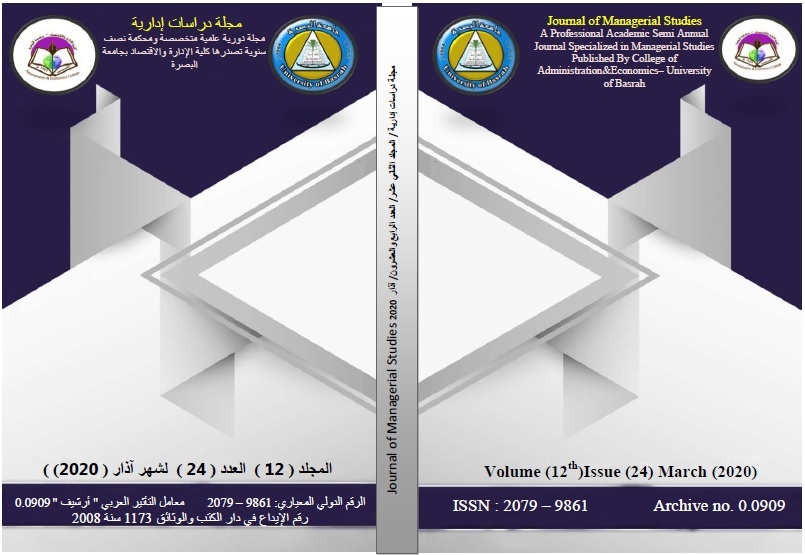Abstract
The research aims to measure the role the humanitarian logistic
services to improve the effectiveness of measuring the effect between
the independent variable (the humanitarian logistic services) and its
major independent dimensions (the speed of start, the reason of
disaster, the context of the operation and the scientific methods). They
are all indicators oriented to measure humanitarian logistics and the
dependent variable (the effectiveness of the of disaster management)
and its dimensions (pre – alarm regulations system, safety and
readiness system, damages controlling and deterring system, balance
and activity recovery system, strategicsustainable education system).
They are all indicators used to measure the effectiveness of the disaster
management.
The sample of the research was represented by a group of officials
(Top Management), managers from various levels, engineers and
technical technicians who work in humanitarian logistic services sector
in the Iraqi Ministry of Emigration support in the event of disaster after
the problem is to be diagnosed efficiently through visiting the camps of
the displaced from the disastrous Iraqi Governorates.
The researcher depends on the descriptive methodology in the
theoretical side and statistical analysis in the applied side. An adequate
and promoted questionnaire application was developed to serve this
purpose. The Research concluded certain conclusions, the most
important of humanitarian logistic services in the role of the Ministry
of Emigration &Displacement has come to serve this goal that it has its
own influence to improve the effectiveness of the disaster management
in the organizations under research. Moreover, the Research summed
up some recommendations and suggestions, one of which is the
confirmation on the role and the importance of humanitarian logistic
services in the event of the crisis or disaster occurrence and its
significant influence to improve the disaster management especially in
the organizations which are the subject matter of the Research in Iraq
and paying attention.
services to improve the effectiveness of measuring the effect between
the independent variable (the humanitarian logistic services) and its
major independent dimensions (the speed of start, the reason of
disaster, the context of the operation and the scientific methods). They
are all indicators oriented to measure humanitarian logistics and the
dependent variable (the effectiveness of the of disaster management)
and its dimensions (pre – alarm regulations system, safety and
readiness system, damages controlling and deterring system, balance
and activity recovery system, strategicsustainable education system).
They are all indicators used to measure the effectiveness of the disaster
management.
The sample of the research was represented by a group of officials
(Top Management), managers from various levels, engineers and
technical technicians who work in humanitarian logistic services sector
in the Iraqi Ministry of Emigration support in the event of disaster after
the problem is to be diagnosed efficiently through visiting the camps of
the displaced from the disastrous Iraqi Governorates.
The researcher depends on the descriptive methodology in the
theoretical side and statistical analysis in the applied side. An adequate
and promoted questionnaire application was developed to serve this
purpose. The Research concluded certain conclusions, the most
important of humanitarian logistic services in the role of the Ministry
of Emigration &Displacement has come to serve this goal that it has its
own influence to improve the effectiveness of the disaster management
in the organizations under research. Moreover, the Research summed
up some recommendations and suggestions, one of which is the
confirmation on the role and the importance of humanitarian logistic
services in the event of the crisis or disaster occurrence and its
significant influence to improve the disaster management especially in
the organizations which are the subject matter of the Research in Iraq
and paying attention.
